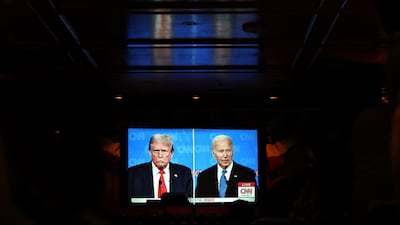The recent televised debate between US President Joe Biden and his rival Donald Trump has left the Democratic Party in disarray. This isn’t just due to Mr Biden’s stumbles, incoherence, sluggishness and stiffness, but also because Mr Trump was brimming with energy and confidence.
Most Americans don’t favour a weak personality, no matter how respectable and decent. While they may not admire Mr Trump’s brash and erratic nature, they desire a decisive president who doesn’t, as many Americans see it, plead with Hamas to accept his initiatives as Mr Biden does, succumb to Iranian or Israeli behaviour, or lead Nato into a potential Third World War.
This was Mr Trump’s message in the debate. Now, Democratic leaders are in a panic and possibly urgently considering Plan B for their leader just four months before the election. While it’s too early to speculate on potential candidates if Mr Biden and Vice President Kamala Harris are dropped from the ticket, this possibility cannot be dismissed entirely.
Despite the importance of domestic issues such as immigration, abortion, the economy, inflation, taxes, health care and retirement, it is important to focus on the foreign policy themes that could dominate the election campaign.
The handling of the US withdrawal from Afghanistan, which the world watched with dismay and which diminished US credibility on the world stage, will be a key issue that Mr Trump uses to criticise Mr Biden. During the debate, he described that episode as disgraceful, saying that it signalled to rival powers that America is weak, unstable, easily defeated, and unreliable for betraying its allies in the middle of the battle.
Mr Trump, on the other hand, boasted about killing Qassem Suleimani, the commander of Iran’s Quds Force, and Abu Bakr Al Baghdadi, the self-declared caliph of ISIS, during his time as president.
Mr Biden said he had a three-phase ceasefire plan for Gaza that was supported by the UN Security Council, the G7 and Israel, claiming that only Hamas opposes his plan. But Mr Trump’s facial expression conveyed pity for a president conceding that his proud initiative, supported globally, has been stalled by Hamas.
Mr Trump boasted that his policies bankrupted Iran, claiming that if the Biden administration had continued them, Iran wouldn’t have had the funds to finance Hamas and its October 7 attack.
Mr Biden challenged Mr Trump by saying that his administration showered Israel with all the weapons it needed, claiming “we saved Israel”. He added that the goal now is to eliminate Hamas. Mr Trump retorted by saying: “Then let them [Israel] finish the job.”
Ultimately, it is not important what each man called the other during the debate; what matters is what remains in the minds of voters from such debates, and it does not seem to favour Mr Biden.
These issues will stick during the election campaign, whether Mr Biden’s initiative succeeds or fails in achieving a phased ceasefire in Gaza to avoid a wider war that could result in an expanded conflict along the Lebanese-Israeli front, probably directed by the Iranian regime.
Iran, which is negotiating with Mr Biden’s team and hopes he remains in the White House, will now probably return to the policymaking table very concerned in the wake of the debate. The Tehran leadership is scattered, divided and confused, sometimes appearing confident in a historic deal with the Biden administration, and at other times, fudging the details as it does not want to give up its formidable proxies operating in sovereign Arab countries – these ultimately being the fulfilment of the true doctrine of the regime.
In recent times, Hezbollah’s leadership has been panicking over the possibility of a historic understanding between Iranian leaders and the Biden administration to curb Hezbollah’s appetite for a war with Israel that would mobilise all “Islamic resistance” factions. It fears an American-Iranian-Israeli deal that could sideline Hezbollah’s leadership.

Today’s panic may subside as the potential failure of Mr Biden’s initiative at the hands of Hamas will increase the Democratic Party’s insistence on unconditional support for Israel to wreak havoc as it pleases in Gaza and Lebanon, without American restraint, but with American weapons, planes, ships and ammunition.
Hezbollah secretary general Hassan Nasrallah and Hamas’s Gaza head, Yahya Sinwar, must accurately read the American political scene.
In the run-up to the presidential election, neither Republicans nor Democrats will hesitate to provide unequivocal support to Israel to eradicate Hamas and Hezbollah, particularly if they are not convinced by Mr Biden’s initiative.
Mr Sinwar must understand that Iran will not sacrifice its major interests for the 120 hostages that his group still holds. If it does, any direct Iranian-Israeli war, as unlikely as it appears at this moment, won’t be because Tehran seeks to install Mr Sinwar as a victorious leader emerging from the tunnels.
The countdown to patience is ticking. Even Arab countries trying to help Gaza are losing patience with Hamas and Mr Sinwar’s intransigence.
Returning to the Biden-Trump debate, Iran understands that the latter is a dealmaker, not a warring president; a sanctions man, not an appeaser; and a decisive leader, not a negotiator over futile bargains.
If it returns to the policymaking table following its own presidential election, which is heading to a run-off next week, Iran will probably adopt strategic patience.
No matter the differing opinions and divisions within the Iranian leadership, they are all determined to continue to use the regime’s proxies and insist on reminding them that it is Tehran that is the decision-maker and the one that calls the shots.

















